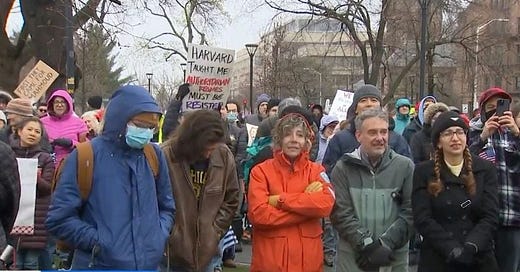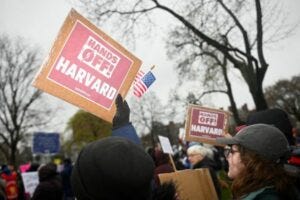President Trump has stepped up his attacks on the universities. Accusing the universities of antisemitism, woke culture, and DEI programs, the Trump administration demanded that these schools make concessions or risk losing federal funding. Columbia University caved into Trump’s demands without putting up a fight when Trump threatened to cease $400 million in federal funding.
Thus, it is heartwarming to see that Harvard University, America’s oldest and richest university, announced last Monday that it could resist Trump’s demands on hiring, admission, and curriculum, even though the University might lose $2.2 billion in multi-year federal grants and other contracts.
Many believe that if Harvard, with its 53 billion endowment, cannot stand up to the government, other schools have a much less chance. Harvard’s bold move has emboldened other universities. The acting president of Columbia, Claire Shipman, announced that Columbia would not surrender control of the school.
Harvard has no other choice. It would no longer be Harvard had it accepted Trump’s demands. The demands included reducing of the power held by faculty, auditing programs that contribute to antisemitism, auditing “viewpoint diversity” among its affiliates, reporting data on faculty hiring and student admissions, and calling in police against student protesters. Harvard President Alan M. Garber wrote to the community, “No government — regardless of which party is in power — should dictate what private universities can teach, whom they can admit and hire, and which areas of study and inquiry they can pursue.”
Watching what happened to Columbia, the Harvard community mobilized to protect their University against Trump’s unjustified demands. More than 800 faculty members across Harvard’s schools signed a petition to Harvard’s governing board circulated on March 24, 2025, urging the University to protect Harvard’s independence and academic freedom. The petition demanded:
1. Publicly condemn attacks on universities.
2. Legally contest and refuse to comply with unlawful demands that threaten academic freedom and university self-governance. Freedom from political interference has allowed American universities to lead the world in scientific and medical innovation, from which our entire country benefits.
3. Work with other universities and Harvard’s own alumni networks to mount a coordinated opposition to these anti-democratic attacks.
Harvard alumni/ae also organized and pressed the University to protect academic freedom. More than 500 signed a letter to President Gaber urging the University to protect free speech and the independence of its operations. The letter was circulated in the aftermath of the March 8 arrest of Columbia student Mahmoud Khalil, a permanent legal U.S. resident who is facing deportation.
When news broke that seven Harvard University students and five recent graduates had their visas revoked by the government, about 300 Harvard faculty and students, Cambridge residents, and city leaders protested on Cambridge Common last Saturday. An international student from Sweden said, “When ICE agents show up at our doors, Harvard should have our backs.”
Harvard is one of the world’s leading universities because of its ability to attract talented scholars, researchers, and students from around the world. About 23 percent of Harvard students (including graduates and undergraduates) are international students from many countries. Last September, Harvard College matriculated 1,647 students, among them 16 percent international students, 20 percent first-generation college attendees, and 20 percent qualified for federal Pell Grants for low-income students. Harvard scholars, students, and alumni/ae hail from more than 200 countries.
Harvard provided me with a rich and stimulating environment to learn and research when I was a doctoral student at the Divinity School in the mid-1980s. In a required first-year doctoral seminar, the professor chose to spend the semester studying Rudolf Bultmann. The ten of us came from Africa, Asia, Germany, and the U.S., studying the Bible, theology, and Asian religions. We had rich and fascinating discussions, learning from different disciplines and perspectives.
My family spent one year living at the Center for the Study of World Religions. My little daughter’s playmate was the son of a Shinto priest who lived downstairs. He had come to study as a master’s student at the school. The Center had many visiting scholars. Riffat Hassan, one of the pioneers in the feminist study of the Qur’an, lived on the same floor. Another neighbor was Kurt Rudolph, author of Gnosis: The Nature and History of Gnosticism. From his book, I learned about the spread of Manichaean texts and ideas in China.
My daughter attended a primary school in the city of Cambridge. Since Harvard and the Massachusetts Institute of Technology are located in Cambridge, the city has always had a diverse population. My daughter’s class had students from 13 countries. She had a best friend, a Japanese girl named Yuko, who sent her a Japanese doll as a present, and we still had it at home.
Harvard and other Ivy League schools may be elitist, but they are engines of growth and innovation and help train generations of leaders in government, education, business, and the non-governmental sectors. Among the critics of universities in Trump’s circle were several Ivy League graduates. Trump’s attempts to control the universities do not make America great again but destroy institutions that have taken centuries to build. The revocation of student visas and the deportation of students sent chilling signals around the world. The consequences are dire, and I am proud that my alma mater chose to stand up for freedom of inquiry and speech, without which Harvard will cease to be Harvard.




